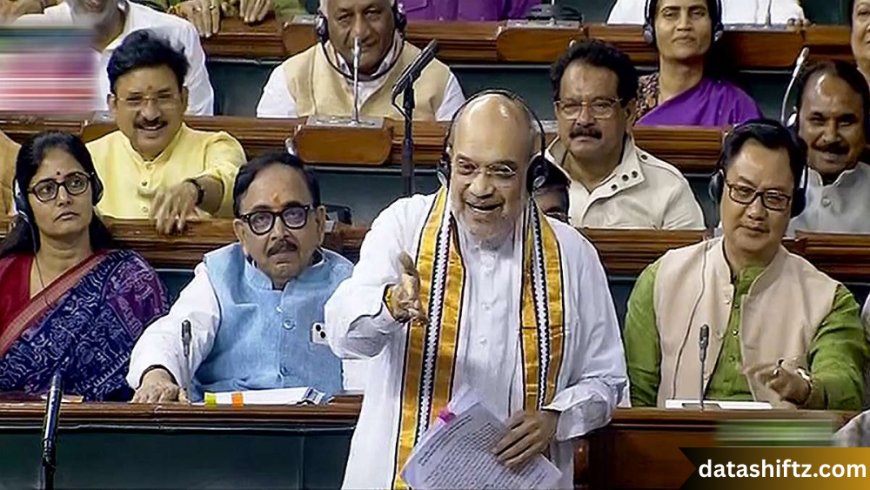Amit Shah Bills: Shaping India’s Legislative Future

Union Home Minister Amit Shah has become a prolific engine of legislative reform, driving landmark bills in areas ranging from criminal justice to constitutional morality, administrative simplification, and regional development. Far more than procedural tweaks, many of these bills signal transformative shifts—reshaping colonial legacies, strengthening institutional accountability, and promoting inclusivity. This article explores the most significant bills introduced by Amit Shah, their objectives, implications, and responses across the political landscape.
Overhauling Colonial-Era Criminal Laws
A Historic Legal Transformation
In August 2023, Amit Shah spearheaded a sweeping overhaul of India’s criminal justice framework. He introduced three new bills to completely replace the colonial-era Indian Penal Code (IPC), Code of Criminal Procedure (CrPC), and Indian Evidence Act (IEA) with modern legislation: namely, the Bharatiya Nyaya Sanhita, Bharatiya Nagarik Suraksha Sanhita, and Bharatiya Sakshya Adhiniyam, collectively aiming to shift focus from punishment to justice
These new laws were designed to:
-
Repeal the offence of sedition and introduce updated definitions for security-related crimes
-
Enable community service for minor offences, video‑recorded searches, e‑FIRs, in‑absentia trials, zero‑FIR codification, and time-bound updates to FIRs
-
Raise conviction ratios and mandate forensic team involvement for serious crimes
These bills were passed into law in December 2023 and came into effect from July 1, 2024
Constitutional Amendment for Political Accountability
The 130th Amendment Bill
On August 20, 2025, Amit Shah introduced the Constitution (One Hundred and Thirtieth) Amendment Bill, proposing a constitutional mechanism for the removal of the Prime Minister, Union Ministers, Chief Ministers, and Ministers in Delhi, if arrested or detained for 30 consecutive days on charges punishable with five years or more—even without conviction.
Key constitutional provisions affected:
-
Article 75: Removal clause for Union Ministers including the PM.
-
Article 164: Applies similar removal criteria to state-level Chief Ministers and Ministers.
This bill was referred to a Joint Parliamentary Committee for detailed scrutiny . It marks a notable stride toward enforcing political accountability, with cross-party nods—Congress MP Shashi Tharoor described it as "reasonable"
Regulatory and Development-Focused Legislation
Jan Vishwas Bill – Administrative Simplification
The Jan Vishwas (Amendment of Provisions) Bill, 2025 seeks to decriminalize 288 minor offences across central laws. Introduced on August 18, 2025, it proposes civil penalties, improvement notices, and rectification mechanisms in place of punitive criminal action. The bill is now under review by a parliamentary committee
IIM Amendment – Northeastern Expansion
Also on August 19, 2025, the Indian Institutes of Management (Amendment) Bill, 2025 was passed, enabling the establishment of IIM Guwahati—India’s 22nd IIM and the second in the Northeast. A ₹550 crore corpus fund has been earmarked for development from 2025–2030
Waqf Amendment – Governance and Inclusivity
The Waqf (Amendment) Act, 2025 overhauls the Waqf property governance framework. Introduced earlier in the year, its reforms include:
-
Centralized digitization and registration to curb mismanagement.
-
Representation of Muslim women and non-Muslims in Waqf boards.
-
Oversight by district collectors for disputed properties
The act has drawn both praise for improving transparency and criticism for potential overreach and infringement on religious autonomy
Summary Table of Key Bills
| Bill / Act | Introduced By | Key Purpose & Provisions | Status |
|---|---|---|---|
| Bharatiya Criminal Laws (2023) | Amit Shah | Replaced IPC, CrPC, IEA; modernized justice delivery, penal reform | Enacted; effective from July 1, 2024 |
| Constitution (130th Amendment) Bill, 2025 | Amit Shah | Framework for removing ministers held in custody ≥30 days without conviction | Pending; at Joint Parliamentary Committee |
| Jan Vishwas (Amendment) Bill, 2025 | Amit Shah | Decriminalizes minor offences; civil penalties, improvement notices | Introduced; pending committee review |
| IIM (Amendment) Bill, 2025 | Amit Shah | Establishes new IIM in Guwahati, supports NE India development | Passed Lok Sabha |
| Waqf (Amendment) Act, 2025 | Amit Shah | Enhances governance of Waqf properties, inclusivity, digitization | Enacted; under implementation |
Comprehensive Recap in List Format
-
Criminal Law Overhaul (2023):
-
Introduced three new Acts replacing IPC, CrPC, and IEA.
-
Aimed at expunging colonial legacies and streamlining justice.
-
Key features: video search, e‑FIR, community service, forensic mandates.
-
Effective: July 1, 2024
-
-
130th Constitutional Amendment Bill (Aug 2025):
-
Enables removal of detained ministers after 30 days.
-
Enhances constitutional accountability across Union and States.
-
Pending in Joint Committee
-
Garnered cross-party support from figures like Shashi Tharoor
-
-
Jan Vishwas Amendment Bill (Aug 2025):
-
Decriminalizes hundreds of minor offences.
-
Promotes ease of business and citizen‑friendly governance.
-
Referred to a parliamentary panel
-
-
IIM Amendment Bill (Aug 2025):
-
Enables IIM Guwahati’s establishment in the Northeast.
-
Allocates ₹550 crore through 2030 for development
-
-
Waqf Amendment Act (2025):
-
Secures digitization, inclusivity, and oversight in Waqf management.
-
Mixed reception: administrative transparency vs. minority autonomy concerns
-
Conclusion
Amit Shah’s legislative leadership is reshaping India’s legal and institutional architecture. From dismantling colonial criminal laws to instilling constitutional accountability in governance, his initiatives reflect sweeping reform across multiple fronts. The Jan Vishwas and Waqf reforms underscore administrative modernization, while the IIM expansion addresses regional equity and higher education goals.
Together, these bills portray a government in deep reform mode—aiming to enhance justice, streamline governance, and champion inclusive development. Their full impact will depend on parliamentary deliberation, implementation rigor, and public reception in the weeks and months ahead.





























